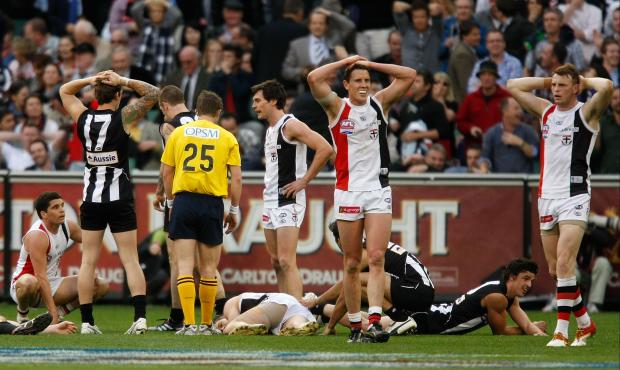In fact, only two times since 1987 has there been a season with no ties.
In this stretch, 457 days and 309 games have passed since current top four teams, the Sydney Swans and Fremantle, played a draw in round eight, 2013.
So with 27 games remaining and not a tied game played as yet in 2014, the competition is due to experience one, particularly as ties have run at about one every 96 games since 1897.
Of course you could just as easily argue the competition is overdue for a year without a tie but after several cliffhangers in recent weeks (and the past two Grand Finals being between teams from different states), the way AFL rules deal with ties needs to return to the agenda in the off-season.
That's because if a draw occurs in the next six weeks, three different outcomes will eventuate depending on what part of the season a tie occurs.
It is madness.
The question is whether it's a madness the AFL Charter wants to continue to encourage as a unique characteristic of the game.
Click here for more Numbers Game with Peter Ryan
The rules, for those who need reminding, are as follows:
If a draw occurs in the home and away season, both teams will gain two premiership points.
That wouldn't be much help to West Coast or Richmond or Gold Coast - teams that are desperate to secure that last spot in the final eight.
Faced with the choice, you would imagine they would be happy to continue into extra time to get a result that might give them a finals spot.
Imagine the drama if the combatants went into extra time, fighting for a spot in the finals.
Imagine if it happened on the Gold Coast with the Suns hosting the Eagles at Metricon Stadium in round 23. What an advertisement for the game.
Imagine the alternative: the draw being explained on a loudspeaker to expansion club supporters on the Gold Coast as its players slumped on the ground.
After the end of round 23, in the following eight games – played in the first three weeks of finals – a tie will be decided with both teams playing extra time.
That regulation relating to draws in finals series matches (regulation 2.8a) requires five minutes to be played at each end. The team with the highest points at the end of additional time is the winner.
That seems the most sensible rule applied to draws. Yet it only happens in eight games each season.
Only six finals other than Grand Finals have been tied and only two games in AFL history have been decided using extra time: the 1994 qualifying final between North Melbourne and Hawthorn and the 2007 semi-final between West Coast and Collingwood.
The Kangaroos eventually won the 1994 clash after Wayne Carey kicked the sealer in extra time, while Collingwood overran the Eagles with 3.3 to 0.2 in the two five-minute extra periods.
These results were dramatic and fair to all participants.
Why not apply that rule to the other 199 games played each season?

Imagine the drama if the St Kilda-Collingwood Grand Final went to extra time. Picture: AFL Media
For those too young to know, scores suggest the 1948 replay was all over at quarter-time.
And if the replay is drawn, it's likely it would be decided in extra time given the ruling made in 2010.
Only eight times have there been ties in consecutive rounds in the game's history, so it's highly unlikely a replay would be drawn again, even between two evenly matched teams.
But that doesn't mean there should not be a plan in place.
It's too late to change anything for this season but the issue of playing extra time to decide the Grand Final should be considered for 2015.
Particularly with the season not scheduled to finish until the Grand Final on October 3 and only one bye in place.
It's time for extra time to be applied to all ties in 2015.
Little would be lost - of course the extra revenue of a Grand Final replay is not to be sneezed at but the memory of the drama would sell well - and plenty would be gained.
And I'd argue for good measure that a penalty shoot-out consisting of a series of kicks from the 50-metre arc should be considered when scores are still tied after 10 minutes of extra time.
Now that would stop some hearts.
But that debate is probably for another time.
Let's start with extra time to decide all ties.
Ties for each club since 1897
Essendon: 34
Carlton, Fitzroy/Brisbane Lions: 33
Collingwood: 26
St Kilda, Fitzroy: 25
Sydney Swans: 24
Western Bulldogs, Richmond: 22
Melbourne, Geelong: 21
North Melbourne: 17
Hawthorn: 10
Port Adelaide, West Coast: 5
University: 2
Adelaide, Fremantle: 1
Gold Coast, Greater Western Sydney: 0
Years without a tie:
R1-R19 2014, 2004, 2001, 1986, 1984, 1983, 1981, 1975, 1970, 1965, 1958, 1955, 1949, 1940-42, 1938, 1936, 1930-31, 1920, 1918, 1912, 1906-08, 1902, 1899-1900


